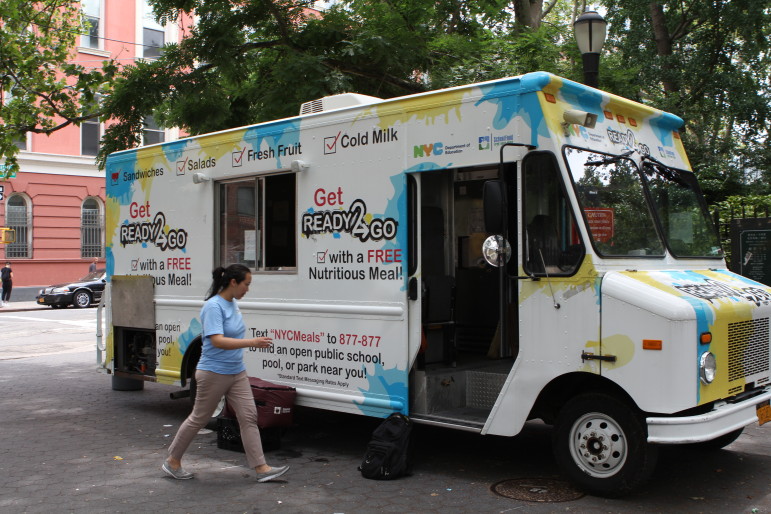
Patrick Donachie
The SchoolFood truck parked near a crosswalk at Rivington Playground in Sarah D. Roosevelt Park now serves 500 meals a day.
On a vindictively hot July midday, the SchoolFood truck was parked near a crosswalk at Rivington Playground in Sarah D. Roosevelt Park, as it had been each day since June 28th. Liana Wong, the truck’s manager, stood by the side window of the vibrantly colored vehicle holding a soft cooler stuffed with miniature cartons of milk. Kumar, another SchoolFood employee, gave out lunches stored in tiny white paper bags to any child who asked for one.
“When are you guys here?” one parent asked Kumar (who didn’t give his last name) as she retrieved a lunch for her young daughter.
“We’ll be here every day,” Kumar said. “Every day.”
SchoolFood, the Department of Education’s arm for producing and distributing school meals supplies approximately 850,000 meals to students during the regular school year. The food trucks are a part of SchoolFood’s Summer Meals Program, offering free meals to children at hundreds of locations throughout the city during summer break.
“We started pretty low this summer with 200 kids,” Wong said as she dispensed lunches consisting of sandwiches, fruits and salads to approaching children. “But we’ve moved up to around 500 every day.”
SchoolFood has four trucks operating during lunch hours in the city this summer. According to SchoolFood’s website, in addition to Roosevelt Park trucks also station at Orchard Beach during weekdays and at Roberto Clemente Park on weekends in the Bronx, at Flushing Meadows and Corona Park Zoo and at Corona Plaza at 103rd Street and Roosevelt Avenue in Queens.
SchoolFood focuses on supplying meals, but the impact of those free lunches resonated in the children’s lives, including in their ability to continue their education throughout the summer.
“A lot of these kids . . .they’re really stressed out. They don’t know where their next meal is going to come from,” says anti-hunger advocate Megan Cryan. “You take away that stressor, and they’re able to concentrate on other areas, like summer camp, like literacy, like learning.”
The truck on the Lower East Side marks the first time SchoolFood has assigned a truck to Manhattan, and it’s one of many options in the borough where children under 18 can procure a free meal. A pamphlet Wong offered parents advertised the Summer Meals program with a listing of Manhattan locations on the back; the number of schools, parks and playgrounds nearly exceeded 90 places.
The Summer Meals Program is heartily promoted by the No Kid Hungry Campaign, part of child hunger nonprofit Share Our Strength. According to Cryan, the campaign’s New York director, the Summer Meals program reached more children when it expanded to playgrounds, pools, and eventually trucks.
“In the beginning, there were a lot of schools, and kids didn’t want to come to schools,” she says.
Eric Goldstein, the Chief Executive Officer at the Office of Support Services for the Department of Education, agrees that the new locales boosted the program’s success.
“Through the trucks, we’ve extended our reach to where the students are,” he says. “We’ve been very diligently trying to expand the program. We started weekends last summer.”
Currently, the trucks are the only Summer Meal locations that serve children on the weekends.
SchoolFood started with just one food truck in 2010, but attained three more by 2013. According to a case study of the trucks’ efficacy conducted by Share Our Strength in 2014, more than 6,000 meals were given out by the trucks per day, though the trucks only served about six percent of the more than 7.6 million meals given to students throughout that summer.
“A lot of these kids don’t have anything to eat,” Wong said during a quick lull in activity. “We want them to know we’re here every single day.”
During the regular school year, Wong works as a manager for two to three schools, ensuring that the meals are delivered and that the cafeterias are up to code. She viewed the food truck assignment as a welcome respite.
“No paperwork, no filing,” she said. “This is almost a break for me.”
SchoolFood’s Summer Meals Program is mostly subsidized by the federal government through the Summer Food Service Program (SFSP), established by the U.S. Department of Agriculture (USDA). SchoolFood asserts that it meets and often exceeds the requirements mandated by the USDA Nutrition Standards for School Meals.
A few blocks south of the Rivington Playground food truck, at the corner of Forsyth and Canal Streets, stands the expansive facility housing Pace High School, M.S. 131 and Emma Lazarus High School. The building’s cafeteria is one of the places children can visit at breakfast or lunchtime for a free meal.
At the intersection outside the school’s entrance, crossing guard Juliet Lee-Ramos said that she’d often see familiar faces everyday for breakfast and lunch and remarked that the program served struggling parents and children
“It really helps the parents. A lot of them can’t always afford lunch,” she said. “And there’s a lot of young kids on the Lower East Side.”
SchoolFood provides free lunches at various locations through Sept. 4. No identification or documentation is required, and lunches are free to any child under 18 years of age. To find the location nearest to you, visit SchoolFood’s website or use SchoolFood’s mobile app for Android or Apple.
Summer vacation is a time of worry for teachers, principals, parents and policymakers who fear that students will lose ground during the long break. This summer, City Limits will look every week at some aspect of the citywide, summer-long effort to stop the summer slide.









One thought on “Summer Lunches Can Support Summer Learning, Advocates Say”
There ought to be a Wifi signal in the truck so the kids can check their phones if they don’t have a data plan.